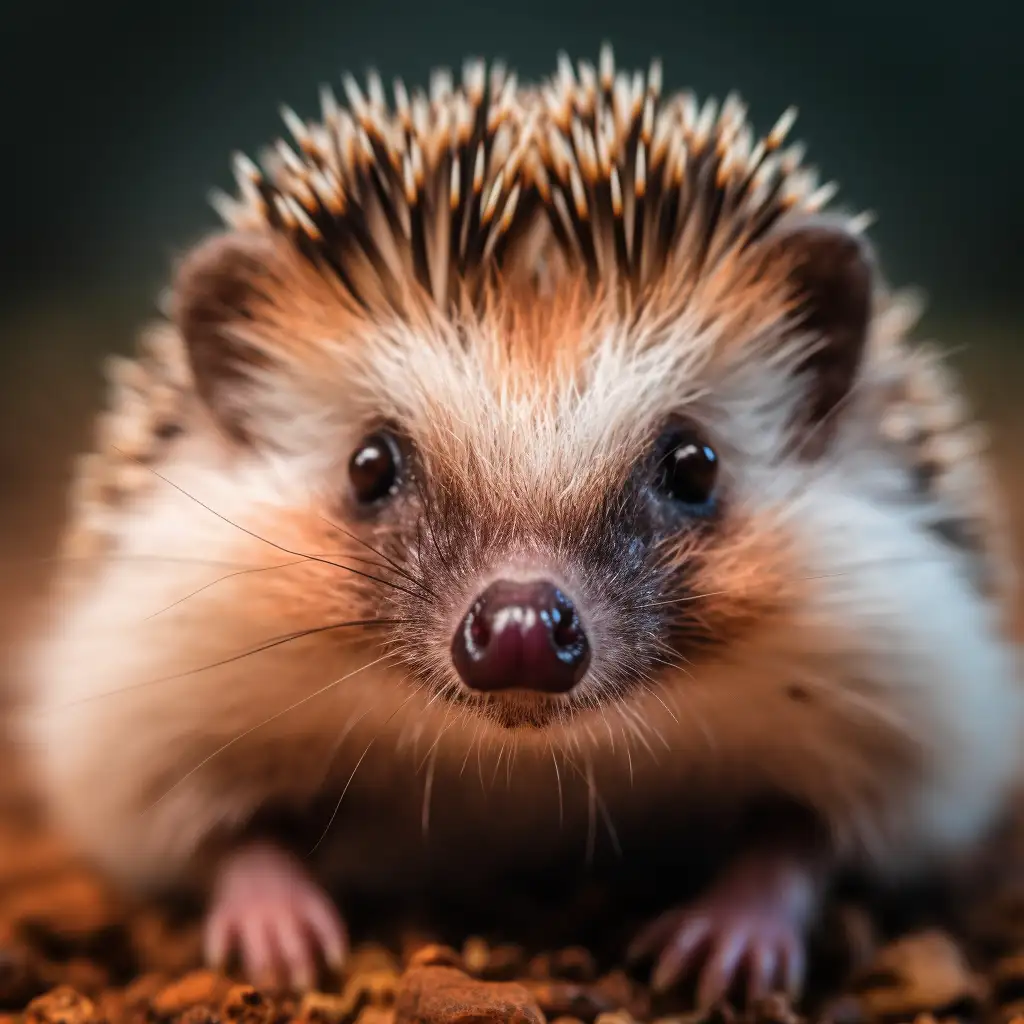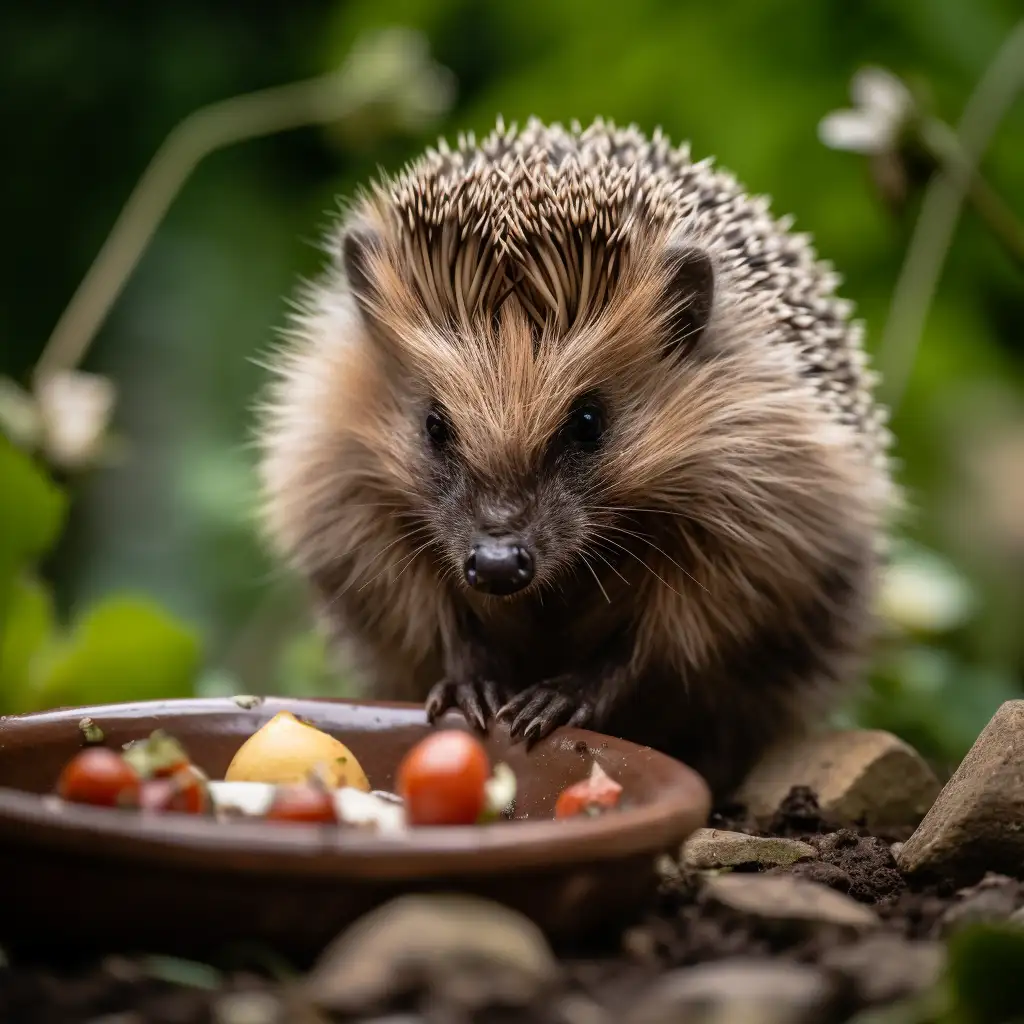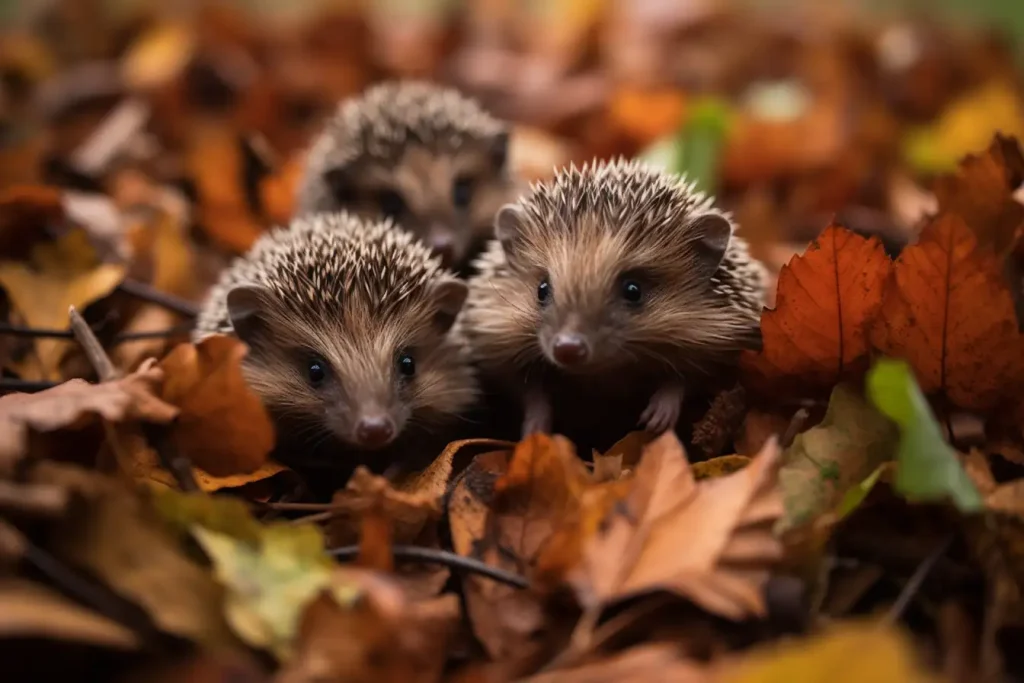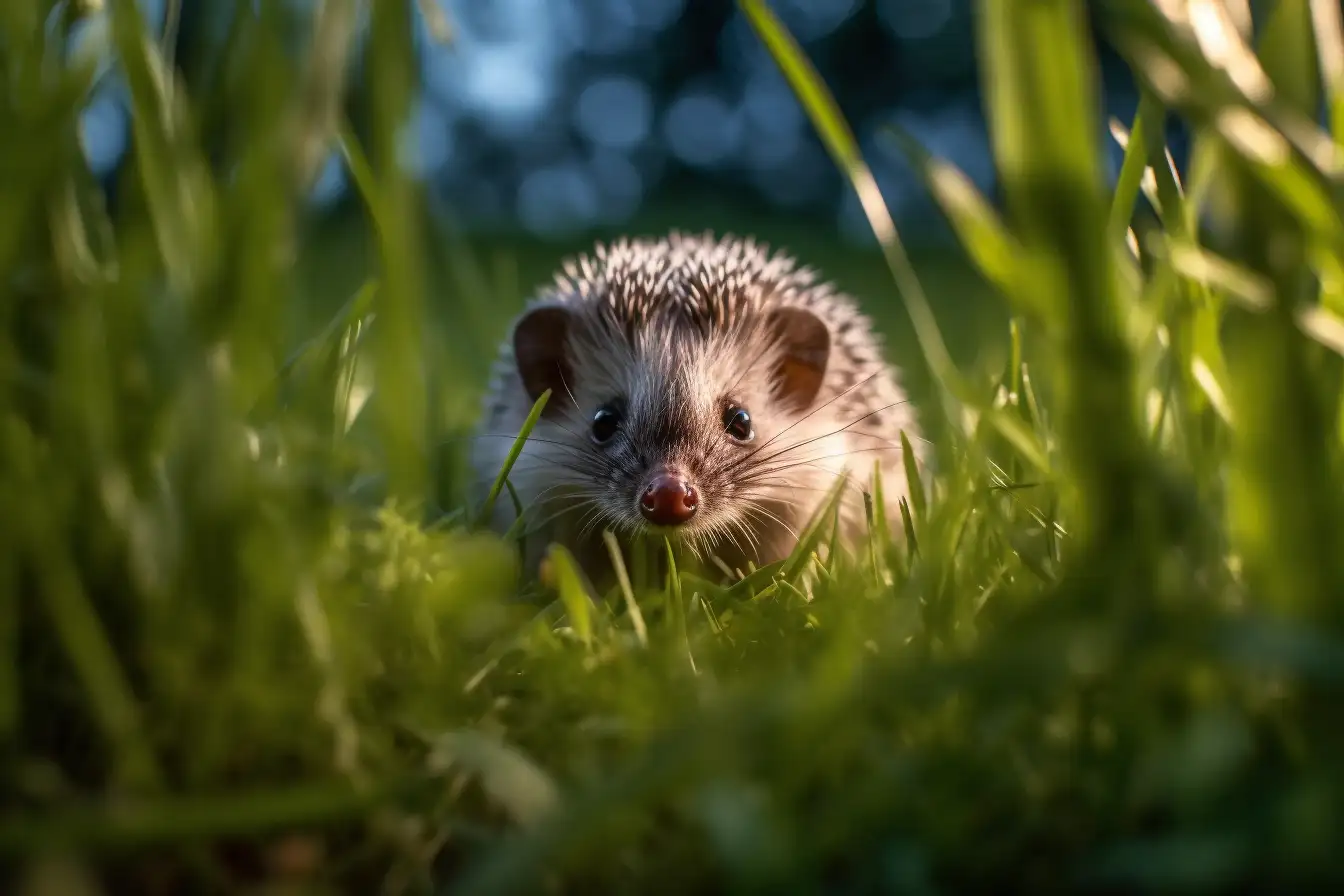Table of Contents
Hedgehogs primarily eat a diet that includes a variety of insects, spiders, and other small invertebrates. They may also consume plant matter and birds’ eggs if available. For those kept as pets, a common dietary choice includes high-quality cat food, which provides a good balance of protein and fat. Additionally, they can eat certain fruits and vegetables, such as bananas, apples, blueberries, watermelon, strawberries, sweet potatoes, turnips, spinach, romaine lettuce, carrots, and broccoli, as treats. However, some foods, like grapes, are toxic to hedgehogs and should be avoided. It’s also important to note that hedgehogs should only be given water to drink, as milk can cause digestive problems.
If you have found a hedgehog in the yard, you might be wondering what, if any food, you can provide for it. These nocturnal creatures usually consume a diet of small spiders and insects as well as plants. They will also eat birds’ eggs if they come across them.
Types of Insects and Spiders Consumed by Hedgehogs
In their natural habitat, hedgehogs demonstrate quite a fascinating feeding behavior. As insectivores, they feed primarily on a wide variety of insects, but did you know they have specific favorites that make up the bulk of their diet?
Beetles: A Hedgehog Staple
Hedgehogs have a particular affinity for beetles. The reason for this might lie in the beetles’ abundance in the hedgehog’s natural environment as well as their relatively large size, which offers a substantial energy reward for the effort of catching them. So, if you have a garden teeming with beetles, it’s quite likely you might spot a hedgehog or two feasting at night.
Earthworms: More than Just a Delicacy
Beyond beetles, earthworms are another top food item for these spiky mammals. The availability and size of earthworms, combined with their high protein content, make them an ideal food source. Earthworms also tend to be active at night, coinciding with the hedgehog’s nocturnal lifestyle, which makes them an easy catch.
Moths and Caterpillars: A Treat for the Nocturnal
Other insects, like moths and their larvae (caterpillars), also feature prominently in the hedgehog’s diet. Moths are particularly active at dusk and dawn, aligning with the hedgehog’s preferred feeding times. Moreover, the soft-bodied caterpillars offer an easy-to-digest, protein-rich meal for the hedgehogs.
Spiders: The Unexpected Component
Spiders are another favorite, although they may not comprise the largest portion of the hedgehog’s diet. Hedgehogs seem to enjoy hunting spiders, perhaps because they present a bit of a challenge compared to other prey. Their nutritional value and the fact that they are active at night make spiders an excellent addition to the hedgehog’s menu.
The diet of hedgehogs speaks volumes about their vital role in our ecosystems, as they help keep populations of these insects and spiders in check. By better understanding the specifics of their diet, we can make our gardens more hedgehog-friendly, and if we are keeping them as pets, we can offer them a diet that is close to what they would consume in the wild.
What About a “Domestic” Diet
If you are wanting to leave food out for any hedgehogs in your yard, try tinned cat or dog food or crushed up biscuits. However, avoid fish-based foods. In terms of liquid, hedgehogs should be given plain water but never milk. Milk causes diarrhea in hedgehogs.
in your yard, try tinned cat or dog food or crushed up biscuits. However, avoid fish-based foods. In terms of liquid, hedgehogs should be given plain water but never milk. Milk causes diarrhea in hedgehogs.
Importance of Hydration for Hedgehogs
Why Hydration Matters
Hedgehogs, just like humans and other pets, need regular access to clean, fresh water to stay healthy. Water plays a crucial role in their body functions, including digestion, nutrient absorption, and maintaining body temperature. A well-hydrated hedgehog is more likely to be active and exhibit a healthy appetite. Moreover, adequate hydration helps keep a hedgehog’s skin in good condition, preventing skin issues which can be common in these little creatures.
Signs of Dehydration
Recognizing signs of dehydration in your prickly friend is critical to ensure timely intervention. Dehydration can result in serious health problems if not addressed promptly. Some of the common signs of dehydration in hedgehogs include:
- Lethargy: Hedgehogs are usually active during the night. If your hedgehog is less active than usual or seems unusually sluggish, it might be a sign of dehydration.
- Loss of Appetite: A decrease in food consumption can also indicate dehydration. If your hedgehog isn’t showing its usual interest in food, it’s worth considering if dehydration could be the cause.
- Sunken Eyes: This is a tell-tale sign in many animals, including hedgehogs. If the eyes appear sunken or dull, it suggests that your hedgehog might be dehydrated.
- Dry Skin: If the skin under the quills looks flaky and dry, it might be due to inadequate hydration.
- Decreased Urine Output: Paying attention to the amount your hedgehog urinates can provide insight into its hydration level. Reduced urine output is a common sign of dehydration.
If you notice any of these signs, it’s crucial to encourage your hedgehog to drink more water. You can do this by offering water through a dropper or syringe (without a needle), or by introducing juicy fruits like watermelon into their diet. Remember, serious cases of dehydration require immediate veterinary care.
Keeping Your Hedgehog Hydrated
Hydration should not be an afterthought when caring for a hedgehog. Make sure fresh water is always available, changing it daily to prevent bacteria growth. Some hedgehogs may prefer drinking from a bowl, while others might take to a water bottle. Experiment to find your hedgehog’s preference, making sure the chosen method is always clean and accessible.
Adding wet food to their diet can also contribute to their water intake. And while fruits should only form a small part of their diet, the occasional fruit treat can provide extra hydration. Just ensure to avoid grapes and raisins, as these can be toxic to hedgehogs.
Proper hydration plays a significant role in your hedgehog’s overall health and wellbeing. By ensuring your hedgehog stays adequately hydrated, you are taking a vital step in supporting their health and longevity.
If you have a pet hedgehog, the right diet is essential to its health and wellbeing. Hedgehogs do love eating and will pretty much eat anything that you put for them. However, this doesn’t necessarily mean they can or should eat anything. These cute little mammals require specific foods to keep them healthy, so it is important that you understand their dietary needs.
You can find food specifically for hedgehogs in some pet stores or online, but most hedgehog owners agree that cat food is a better choice. This is because there is a lot more choice, the quality of the ingredients is much higher, and it is cheaper to buy. Look for adult cat food as it has less fat in it than the kitten food. It is important not to feed the hedgehog too much fat. They require high protein, low fat food for a healthy diet.

Nutritional Requirements of Hedgehogs
Proteins and Fats
One key component of a hedgehog’s diet is protein. Hedgehogs, particularly in the wild, are insectivores. Their natural diet consists mainly of insects, which are an excellent source of protein. As such, a diet rich in high-quality animal-based proteins is necessary for them. Aim for a protein content of around 20-35% in the food you provide.
Fat is another crucial nutrient for hedgehogs, although their diet should be low in fat to avoid obesity and related health issues. The fat content of a hedgehog’s diet should ideally be kept around 5-15%.
Carbohydrates
While hedgehogs have the ability to digest certain types of carbohydrates, their carbohydrate intake should be moderate. High levels of carbohydrates, especially simple sugars, are not beneficial for hedgehogs and can lead to health problems such as obesity and diabetes.
Vitamins and Minerals
Hedgehogs also require a variety of vitamins and minerals for their health. Calcium, for instance, is crucial for bone health. The ratio of calcium to phosphorus in a hedgehog’s diet should be around 1:1 to 2:1. Ensuring an appropriate calcium intake can help prevent metabolic bone disease, a common ailment in captive hedgehogs.
Vitamins A, E, and B12 are also important for hedgehogs. Vitamin A is crucial for vision, immune function, and reproduction. Vitamin E acts as an antioxidant, protecting cells from damage, and Vitamin B12 is needed for a healthy nervous system and red blood cell production.
Fiber
Lastly, while hedgehogs don’t need large amounts of dietary fiber, a certain amount can be beneficial. In the wild, the chitin from insects’ exoskeletons provides a source of fiber. In a captive environment, this can be substituted with a small amount of fresh fruits and vegetables.
It’s crucial to remember that each hedgehog is unique, and nutritional needs may vary based on factors like age, health, and activity level. So, it’s always a good idea to consult with a professional or do thorough research when creating a dietary plan for your prickly pal.
Here is a table that contains some information about foods that hedgehogs can eat
| Food Category | Specific Food | Nutritional Benefits | Feeding Frequency |
|---|---|---|---|
| Insects | Mealworms | High in protein, good source of fat | Daily (small amounts) |
| Insects | Crickets | High in protein, low in fat | Daily (small amounts) |
| Fruit/Veg | Apples | Vitamins and fiber, low in calories | 2-3 times a week (small pieces) |
| Fruit/Veg | Carrots | Rich in vitamins, particularly Vitamin A | 2-3 times a week (cooked or finely shredded) |
| Cooked Meat | Chicken | High in protein, low in fat | 1-2 times a week (small pieces) |
| Cooked Meat | Turkey | High in protein, low in fat | 1-2 times a week (small pieces) |
| Dry Cat Food | Kitten Formula | Balanced diet, high in protein | Daily (main diet) |
| Special Diet Food | Hedgehog Pellets | Specifically formulated for hedgehogs’ dietary needs | Daily (main diet) |
| Treats | Hard Boiled Egg | High in protein, vitamins, and minerals | Once a week (small pieces) |
| Treats | Banana | Source of potassium and vitamins, but also sugar | Once a week (small pieces) |
Note: Any new food should be introduced gradually, and the overall diet should be balanced. Also, certain foods like chocolate, onions, milk, raw meat, and grapes should be avoided, as they can harm hedgehogs. Always provide fresh water for your hedgehog. Furthermore, every hedgehog is different and might have different dietary preferences or needs. If your hedgehog shows any sign of distress or illness after trying a new food, contact your vet immediately.
Should You Give Hedgehogs Snacks?
Hedgehogs do have a varied diet in the wild, so sticking to cat food alone would not be very interesting or healthy for your pet. Treats are a good way to ensure the hedgehog is getting extra nutrition and it will naturally please your pet to have something different every so often. Remember though that treats should only be provided in moderation.
Fruits and vegetables are good treats for pet hedgehogs. You can provide fruits such as bananas, apples, blueberries, watermelon, and strawberries. Nevertheless, never feed grapes to your hedgehog as these are toxic to them and could potentially cause damage to the liver and kidneys.
Some good vegetable options include sweet potatoes, turnips, spinach, romaine lettuce, carrots, and broccoli.
How to Safely Change a Hedgehog’s Diet
While it’s often necessary to adjust a hedgehog’s diet for its optimal health, it’s equally important to make these changes gently. Hedgehogs are sensitive creatures and drastic changes can lead to stress, resulting in a loss of appetite.
Gradual Transition
When introducing a new food into your hedgehog’s diet, it’s best to start gradually. Begin by mixing a small amount of the new food with the food your hedgehog is accustomed to. Over the course of one to two weeks, slowly increase the proportion of the new food while decreasing the old one. This slow transition not only gives your hedgehog time to adapt to the taste and texture of the new food, but also allows their digestive system to adjust, reducing the risk of gastrointestinal upset.
Monitor Their Eating Habits
During the transition, carefully monitor your hedgehog’s eating habits. If your hedgehog seems hesitant to eat the new food or if it picks around it, don’t be discouraged. Continue offering the new food while reducing the amount of the old food. This can encourage your hedgehog to try the new food. However, if your hedgehog completely refuses to eat or begins to lose weight, consult with a professional as this could be an indicator of other health issues .
.
Introduce Variety Over Time
Introducing variety into your hedgehog’s diet is also an important aspect of dietary change. Once your hedgehog has successfully adjusted to the new primary food, consider adding a variety of appropriate fruits, vegetables, and insects to their diet. The addition of these foods can provide a range of nutrients essential to your hedgehog’s health. As with the main diet change, introduce these new foods gradually and monitor your hedgehog’s response.
By taking a slow and measured approach, you can successfully change your hedgehog’s diet while minimizing stress and maximizing their overall health and happiness.

Common Dietary-Related Illnesses in Hedgehogs
In the wild or in our homes, hedgehogs face a unique set of dietary challenges that can, unfortunately, lead to health issues if not addressed properly. Their innate curiosity and willingness to consume almost anything may lead to improper diet, causing several health problems.
Obesity
One of the most common health concerns in hedgehogs, especially those in captivity, is obesity. Like many pets, they can easily become overweight if their diet is not properly managed. Overconsumption of high-fat foods, such as some cat foods or treats, can lead to weight gain. Obesity can result in additional health complications like heart disease and limited mobility.
Dental Disease
Hedgehogs can also suffer from dental diseases, often due to a lack of variety in their diet or insufficient hard foods to help clean their teeth. Soft foods, while easier for them to eat, do not provide the necessary wear on their teeth, which can lead to issues like plaque build-up and tooth decay.
Vitamin and Mineral Deficiencies
Just like humans, hedgehogs can suffer from vitamin and mineral deficiencies. An inadequate or unbalanced diet may not provide enough vitamins A, E, and B, as well as crucial minerals such as calcium. Vitamin A deficiency can cause skin problems and poor growth, whereas lack of vitamin E can lead to muscle weakness. Calcium deficiency is a serious issue, potentially causing metabolic bone disease, a painful condition that affects the bone structure.
Gastrointestinal Disorders
A sudden change in diet can lead to gastrointestinal disorders in hedgehogs. A diet too high in fat can cause fatty liver disease, while a lack of fiber may lead to constipation or other digestive issues. Food that is difficult for hedgehogs to digest, like milk or complex carbohydrates, can cause stomach upset and diarrhea.
Why is My Hedgehog Not Eating?
If your hedgehog is not eating, you are naturally going to be worried about the cause. It might be the case that the hedgehog is abstaining from food because it is in a new environment. Oftentimes, pets newly arrived in a home will lose their appetite due to the stress of the move.
If you have had your hedgehog for a while but have added something new to its enclosure, the same can apply. Hedgehogs can be uncomfortable with change and may stop eating as they try to adjust.
Unfortunately, a loss of appetite in a hedgehog can also be a sign of illness. In fact, it is usually the first sign that something is amiss so, if your hedgehog is refusing to eat and has not eaten for a number of days, call a vet. While some illnesses can be mild, others can end up being very severe and will require urgent attention.
How Long Can a Hedgehog Go Without Eating?
In the wild, hedgehogs will hibernate when temperatures get very low. They will slow down their metabolism and body functions and will stop eating while they ‘nest.’ Before hibernation, they will have built up their fat stores to help them survive. However, hedgehogs in captivity do not need to hibernate and so will rarely have enough fat stores to survive a long period without eating.
So while hedgehogs in the wild can survive for around ten weeks without eating, it is not the same for pet hedgehogs. If your hedgehog has not eaten for a number of days, contact your vet immediately for advice.
Signs of a Sick Hedgehog
A healthy hedgehog will be alert and responsive but be most active at night, so it can sometimes be difficult to spot the signs of illness immediately. When hedgehogs are awake, they will spend their time sniffing around their enclosure. If you have a wheel, the hedgehog could spend hours running on it, and you might find that it has moved items in its enclosure while you have been sleeping.
When you get up in the morning, you can expect to find both urine and feces in the enclosure and food will be gone.
A sick hedgehog will typically stop eating and may be far less active than normal. If they are not feeling well, they will usually forego running on their wheel. If you notice a difference in how you find the enclosure in the morning, with items left as they were and food untouched, your hedgehog might be ill.
Reduced stools and urine coupled with a loss of appetite and weight loss almost certainly points to an illness. If the hedgehog is also showing other symptoms, such as panting, difficulty breathing, mucus from the eyes and nose, or lethargy, it is crucial that you seek advice from your vet immediately. It could be the case that the hedgehog will improve with an antibiotic or another type of treatment. In the meantime, keep it warm and try to ensure that it is drinking water to avoid dehydration. You might find that using a syringe helps with this.
How to Respond to a Sick Hedgehog
As soon as you notice a change in your hedgehog’s behavior, particularly a loss of appetite or reduced activity, it’s crucial to act promptly and effectively.
Step 1: Evaluate the Symptoms
Begin by carefully observing your hedgehog. Make note of any visible signs of illness such as changes in feces, loss of weight, or signs of discomfort like wheezing or constant scratching. It’s important to remember that hedgehogs, being nocturnal creatures, might display more pronounced signs of discomfort during the night, so you might want to pay closer attention during those hours.
Step 2: Isolation and Comfort
If your hedgehog is showing signs of illness, it’s best to isolate it from other pets to avoid potential spread of disease. This also reduces any stress your hedgehog may feel from other animals. Next, ensure that your hedgehog is comfortable and warm. Maintaining an optimal temperature in its enclosure helps the hedgehog’s body focus on recovery rather than heat regulation.
Step 3: Monitor Food and Water Intake
Keep track of your hedgehog’s food and water consumption. A sick hedgehog might not eat or drink as much as usual. Try offering some of their favorite food and observe if this stimulates appetite.
Step 4: Contact a Veterinarian
Even though you may have taken these measures, consulting with a professional should be your next immediate step. Have all your observations at hand to provide a comprehensive overview of the situation to the vet, this will assist them in diagnosing and prescribing the appropriate treatment.
It’s important to approach this situation with calmness and understanding. Your hedgehog is likely to be stressed and scared, so handle them with care. It may be difficult to see your hedgehog unwell, but with careful observation, gentle care, and professional guidance, you can support their recovery effectively. Remember, each hedgehog is unique and their response to illness may vary. Stay patient and trust in the guidance of veterinary professionals.

Preventive Measures for Hedgehog Health
Regular Health Check-ups
To ensure your hedgehog stays healthy, regular vet visits are paramount. At least once a year, a comprehensive examination should be conducted to monitor your hedgehog’s overall health. This is especially important as hedgehogs age since they can develop issues such as dental diseases or age-related conditions, which may not exhibit clear symptoms until the disease has advanced. Regular health checks can identify potential issues early, providing the best chance for effective treatment.
Maintaining a Clean Environment
Just as important as their diet and regular check-ups, is the environment in which hedgehogs live. A clean habitat is essential for preventing illnesses and creating a comfortable living space for your pet. Regular cleaning of their enclosure, bedding changes, and ensuring their wheel and toys are free from waste is crucial. Inadequate sanitation can lead to the growth of bacteria and fungi which could affect your hedgehog’s health. Furthermore, a clutter-free and appropriately-sized enclosure allows for ample exercise, which is necessary for maintaining a healthy weight and promoting natural hedgehog behaviors.
Balanced Diet
A well-balanced diet plays a pivotal role in maintaining the health of your hedgehog. As these pets require a diet high in protein and low in fat, providing them with high-quality cat food, as already discussed, is a good starting point. Alongside this, incorporate a variety of fresh fruits and vegetables to supplement their diet and provide essential vitamins and minerals. Remember, moderation is key and certain foods, like grapes, are harmful and should be avoided. Regularly altering the variety of food offered can also stimulate your hedgehog’s interest in food, promoting a healthy appetite.
A well-balanced diet not only contributes to the overall health and well-being of your hedgehog but also helps prevent obesity, which can lead to other serious health problems.
In conclusion, preventative measures are not only simple and straightforward to carry out but are also crucial in maintaining a happy and healthy hedgehog. Regular vet check-ups, a clean and suitable environment, and a balanced diet go a long way in ensuring the well-being of your adorable pet.
What Do Hedgehogs Eat – Conclusion
In conclusion, hedgehogs, whether in the wild or kept as pets, have a diverse diet primarily consisting of insects, spiders, and other small invertebrates. Beetles, earthworms, moths, caterpillars, and spiders are among their favorites. Pet hedgehogs can be fed high-quality cat food, which provides a balanced diet of protein and fat. Additionally, certain fruits and vegetables can be given as treats, but some foods, like grapes, are toxic to hedgehogs and should be avoided. Hydration is crucial for hedgehogs, and they should only be given water to drink as milk can cause digestive issues. It’s important to remember that each hedgehog is unique, and their dietary needs may vary based on factors like age, health, and activity level. Therefore, it’s always a good idea to consult with a professional or do thorough research when creating a dietary plan for your prickly pal.
Key takeaways:
- Hedgehogs primarily eat insects, but they can also consume plant matter and bird’s eggs.
- High-quality cat food provides a good balance of protein and fat for pet hedgehogs.
- Fruits and vegetables can be given as treats in moderation, but grapes should be avoided.
- Hedgehogs should only be given water to drink, as milk can cause digestive problems.
- Signs of a sick hedgehog include loss of appetite, reduced activity, and changes in feces, among other symptoms.
- Regular vet check-ups and a balanced diet can help keep hedgehogs healthy.
FAQs
Q: What do hedgehogs typically eat in the wild? A: In the wild, hedgehogs primarily feed on a diet of small insects, spiders, and other invertebrates. They will also consume plant material and birds’ eggs if they come across them.
Q: What can I feed a hedgehog in my yard? A: If you wish to feed a hedgehog in your yard, you could provide tinned cat or dog food or crushed up biscuits. Just be sure to avoid fish-based foods.
Q: What type of liquid should I provide for a hedgehog? A: Hedgehogs should be given plain water to drink. Milk should be avoided as it can cause diarrhea in hedgehogs.
Q: What’s the best diet for a pet hedgehog? A: A diet that includes high-quality cat food, which offers the right balance of protein and fat, is commonly recommended for pet hedgehogs.
Q: Can I buy food specifically for hedgehogs? A: Yes, there are specially formulated hedgehog foods available in some pet stores or online. However, many hedgehog owners prefer cat food due to its higher quality ingredients and affordability.
Q: Can hedgehogs eat fruit? A: Yes, hedgehogs can eat certain fruits like bananas, apples, blueberries, watermelon, and strawberries. However, grapes should never be given to hedgehogs as they are toxic and could cause harm.
Q: Can I give vegetables to my hedgehog? A: Yes, hedgehogs can eat a variety of vegetables including sweet potatoes, turnips, spinach, romaine lettuce, carrots, and broccoli.
Q: What snacks can I give to my hedgehog? A: Fruits and vegetables make for good treats for your hedgehog. However, these should only be provided in moderation.
Q: Why is my hedgehog not eating? A: Hedgehogs can refuse food due to a number of reasons such as stress from a new environment or an illness. If your hedgehog refuses to eat for several days, it’s recommended to consult a vet.
Q: How long can a hedgehog go without eating? A: Wild hedgehogs, which hibernate, can survive around ten weeks without eating. However, for pet hedgehogs that do not hibernate, a few days without food could be harmful.
Q: What are the signs of a sick hedgehog? A: A sick hedgehog may stop eating, be less active, and show other symptoms like panting, difficulty breathing, mucus from the eyes and nose, or lethargy.
Q: What do I do if my hedgehog is sick? A: If your hedgehog is showing signs of illness, it is important to consult a vet immediately.
Q: Can hedgehogs eat dog food? A: Yes, tinned dog food can be an appropriate food source for hedgehogs. However, the food should not be fish-based.
Q: Do hedgehogs need a lot of fat in their diet? A: No, hedgehogs require a high-protein, low-fat diet for optimal health.
Q: Are there any foods that are toxic to hedgehogs? A: Yes, certain foods like grapes are toxic to hedgehogs and can potentially cause damage to their liver and kidneys.
COPYRIGHT NOTICE
Please be advised that all images, designs, and creative content on this page are the exclusive property of JustExoticPets.com and are protected under international copyright laws. The images may not be reproduced, copied, transmitted or manipulated without the written permission of JustExoticPets.com.
and are protected under international copyright laws. The images may not be reproduced, copied, transmitted or manipulated without the written permission of JustExoticPets.com.
Unauthorized use, distribution, display, or creation of derivative works of any images contained on this site, is strictly prohibited and can lead to legal penalties. We actively monitor for, and enforce, our copyright interests.
If you wish to use any of our images, kindly contact us to seek permission. Respect of copyright is not merely a legal requirement but also an acknowledgement and support of the hard work and creativity that goes into producing them.
Thank you for your understanding and cooperation.
© 2023, JustExoticPets.com. All Rights Reserved.

